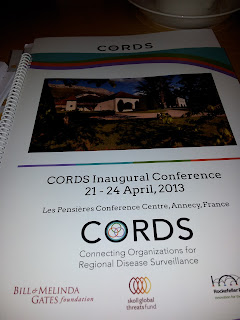On 8-9 April, the SEE Regional Health Development Centre on Communicable Diseases Surveillance and Control, at the National Public Health Institute of Albania in Tirana, held its regular meeting. the National Focal points of all 10 countries, Member States of the SEE Health Network were represented. The event was worganised with the technical support of WHO Regional Office for Europe who was represented by Dr. Caroline Brown, programme Manager.
The objective of the meeting was
to develop a Five Year Proposal for Influenza
Surveillance and Response, in Countries of South East Europe (SEE).
At the
meeting each country presented the issues and their gaps on:
1.
Influenza
surveillance system,
2.
Sentinel
surveillance for ILI and SARI,
3.
Description
of human capacities involved in influenza surveillance,
4.
Information
management system for surveillance data,
5. Laboratory capacities and Influenza testing,
6. National
routine influenza surveillance reporting and collaboration with other sectors,
7. National
data about Influenza Disease burden,
8. Identification
of SARI and febrile illness and early identification of clusters and outbreaks,
9. Rapid
response and containment, and
10. Pandemic preparedness.
Based on the countries´needs and priorities, the plenary and working group discussions and the follow-up work of the RHDC, a project will be developed and submitted to CDC for consideration and support.
What is FAO?
The
US CDC Influenza division is an important partner of the Influenza & Other
Respiratory Pathogens Programme at the WHO Regional Office for Europe,
providing funding through a 5-year cooperative agreement and technical support.
Currently, a CDC senior epidemiologist is seconded to WHO/Europe and other CDC
staff provides support through trainings, missions and provision of reagents.
CDC consults with WHO/Europe when new funding opportunities arise to identify
potential recipient countries.
For
the current Funding Opportunity Announcement (FOA), WHO/Europe was requested to
identify 3 countries: 2 countries were identified and instead of 3rd
country, WHO/Europe recommended funding be made available to the SEE network
through the South East European Centre for Surveillance and
Control of Infectious Diseases, SECID. WHO/Europe
saw this as an opportunity to improve surveillance and response to influenza in
all SEE countries up to an agreed level, over a five-year period. As
different countries are at a different level of capacity, and because the
Republic of Moldova already has a bilateral Cooperative Agreement with CDC for
influenza, it should be possible to agree on allocation of funds according to
needs, resulting in countries receiving different amounts of funding.
Related to this, the FOA mentions only four
countries specifically: Albania because the SECID would be able to receive,
manage and transfer the funds to other countries, and Bosnia & Herzegovina,
Montenegro and the Republic of Macedonia because these three
countries do not currently have a WHO-recognized National Influenza Centre nor
sentinel influenza surveillance systems. The same is true for Kosovo.
The principal intent
of this assistance is to support routine influenza surveillance and build
capacity to respond to and contain highly pathogenic viruses transmissible
among humans. A second intent is to
support the development of epidemiologic, virologic, and related capacity to
detect, respond to, and monitor changes in influenza viruses, as well as
identify outbreaks of severe respiratory illness syndromes. A third intent is to help strengthen the
connections between national institutions in different countries, especially
National Influenza Centres, to more fully participate in the WHO Global
Influenza Surveillance and Response System (GISRS), and become more capable of
sharing specimens and clinical and epidemiologic data on disease related to the
circulation of influenza in more countries.
WHO/Europe
considers the CDC FOA as a great opportunity for SEE countries to develop a 5 year
proposal for collaboration in the area of influenza surveillance and response.
WHO/Europe proposes that the SEE countries develop a proposal based on the
principles that there would be funding allocated to the different countries
according to needs that are measured against the outputs described on page 3 of
the FOA.

















